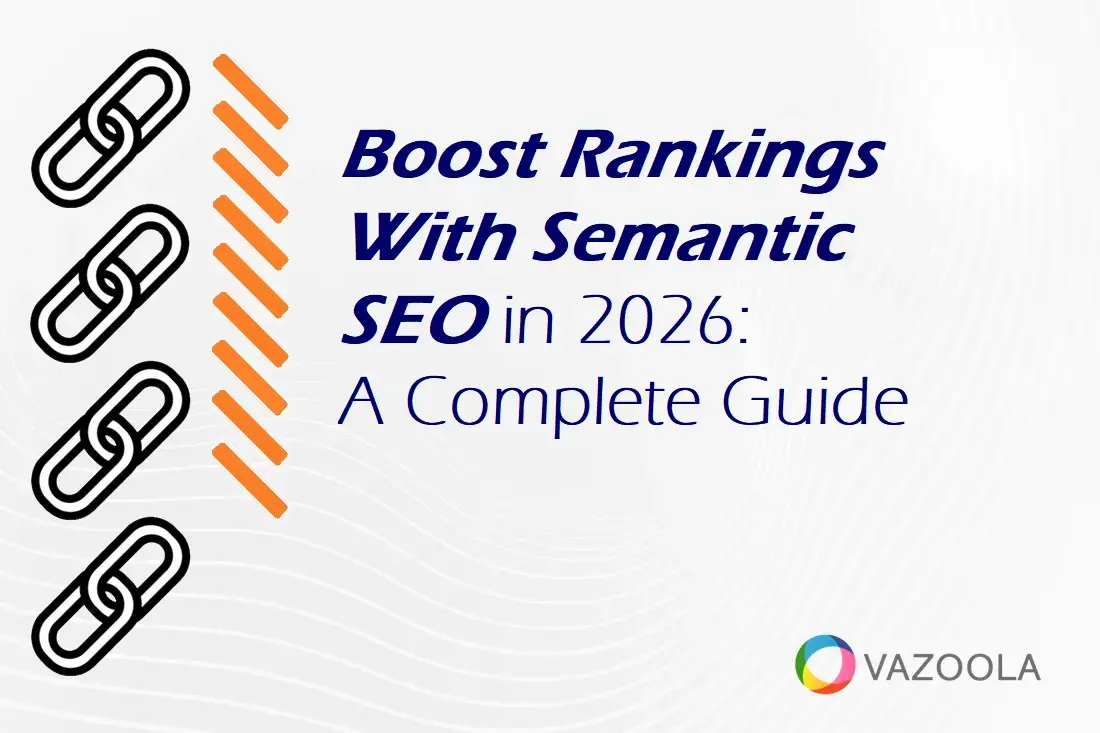Boost Your Rankings With Semantic SEO in 2026: A Complete Guide
Aug 27, 2025
Written by Casey Bjorkdahl

Casey Bjorkdahl is one of the pioneering thought leaders in the SEO community. In 2010, Casey co-founded Vazoola after working for a Digital Marketing Agency for five years in New York City. Vazoola is now one of the fastest growing and most widely recognized SEO marketing firms in the country.

As search engines continue to evolve, they now focus on meaning, context, and user intent. This shift creates a clear opportunity for agencies, content creators, and business owners to increase rankings by aligning with semantic SEO best practices.
Semantic SEO goes beyond stuffing keywords into pages. It emphasizes writing content that addresses what people genuinely want to know while building trust with search engines.
Here at Vazoola, we see firsthand how semantic strategies help revitalize stale content and improve link-building results. By focusing on layered keywords, understanding search intent, and using semantic structures, your team can improve content performance and attract more qualified visitors.
Key Takeaway
-
Semantic SEO shifts content from keyword stuffing to topic-driven writing.
-
Layered keyword strategies build depth and improve rankings.
-
Semantic SEO aligns content with user intent for higher engagement.
-
Tools for LSI keyword research strengthen semantic structures.
-
Semantic SEO and link building work together to enhance authority.
Table of Contents

What Is Semantic SEO?
Semantic SEO optimizes content to match the meaning behind a user’s search rather than exact phrases. It answers broader questions and anticipates related interests, keeping readers engaged while meeting search engine requirements for valuable content.
We encourage teams to focus on natural, topic-based language instead of chasing outdated keyword tactics. This approach supports ranking goals while delivering real value to audiences.
Exact Match Keywords
Exact match keywords involve using phrases exactly as searched. This practice once drove SEO success, but it now feels unnatural and can trigger spam signals with search engines.
Why are exact match keywords outdated?
- They limit natural writing flow.
- They ignore how users search in full phrases and questions.
- Search engines penalize repetitive, thin content.
Modern content strategies replace exact match repetition with variations and context, allowing writers to address user needs effectively.

Semantic Keywords
Semantic keywords
capture the intent and context behind a query. They revolve around a core topic while addressing related ideas that users may also want to know.
Simply put, semantic SEO means you optimize your content by focusing on the meaning behind the query. What is the context of what the visitor is really asking?
Content should focus more on an overall topic rather than one specific question. Semantic SEO takes content one step further by proactively addressing additional questions your visitor might have. You must think ahead, authoritatively.
For some LSI keywords examples:
- A page about “best hybrid cars” may include “EV tax credits,” “battery maintenance,” and “charging station map.”
- A post on “SEO strategies” can include “content clusters,” “search intent,” and “keyword mapping.”
Indeed, semantic SEO structures content around user-centered questions. That way, Google recognizes your page as a comprehensive resource.

Latent Semantic Keywords (LSI)
What are LSI keywords? What is their meaning?
Latent Semantic Indexing (LSI) identifies relationships between terms to understand semantic context. For SEO, LSI keywords are related words that reinforce your page’s topic.
What LSI Keywords Do:
- Help search engines determine page relevance.
- Strengthen topic clusters naturally.
- Improve page ranking without keyword stuffing.
For example, an article about “coffee” may include “brewing methods,” “caffeine content,” and “fair trade sourcing.”
Using these terms enhances topic coverage while supporting SEO goals.

Applying Semantic SEO to Your Content Strategy
Semantic search impacts your content strategy by focusing on layered keywords that align with how people search.
When it comes to semantic SEO, there are three levels of keywords:
- Level 1: Core words like “affordable Vermont homes.”
- Level 2: Theme words such as “moving to Vermont” or “Vermont mortgage rates.”
- Level 3: Stem words answering follow-up questions like “best towns for families in Vermont.”
These layers ensure your content covers what users initially seek while providing related information, increasing on-page engagement and relevance.

Identify entities (people, places, brands, concepts) relevant to your topic using tools like Google’s Natural Language API. Align your content around these entities to improve semantic relevance and boost contextual ranking signals.
Tools for LSI Keyword Research
Using tools for LSI keyword research simplifies semantic content development. These LSI keyword tools identify related keywords and phrases to include naturally within your content.
Looking for the best tools for semantic keyword research? Why not try to Google LSI keywords… or you can employ an LSI keywords generator or tools like:
- Google Keyword Planner
- SEMrush
- LSIGraph
- AnswerThePublic
Keyword research tools help you find LSI keywords and semantically related phrases, expand topic coverage, and build a natural flow in your writing while reinforcing LSI SEO value.

Use tools like MarketMuse or SurferSEO to analyze top-ranking competitors for your target keywords and find missing semantically related topics. Create content to fill these gaps and strengthen your topical authority.
Understanding Search Intent
Search intent reflects why a user searches for something, guiding your content toward providing the right information.
There are three main types of search intent:
- Informational: Seeking knowledge (e.g., “how to start a blog”).
- Transactional: Ready to purchase (e.g., “buy running shoes online”).
- Navigational: Searching for a specific page (e.g., “Vazoola login”).
Matching content to search intent ensures your page meets user needs while improving rankings.

Research “People Also Ask” boxes in Google SERPs to identify semantically connected questions. Create content clusters around these questions to capture long-tail and conversational search traffic.
Social Media and Semantic Search
What is semantic search, and how does it relate to social media?
Social media reflects how users talk about brands and ideas, which can guide semantic SEO strategies. While social posts may not rank directly, understanding trends and language on platforms like LinkedIn and Reddit helps you identify new keywords and relevant topics.
How can you integrate social media into your semantic SEO strategy?
- Track common questions on social channels for content ideas.
- Observe phrasing users use to shape semantic keyword choices.
- Align content topics with social trends to increase relevance.

How Do Semantic and LSI Keywords Work With Link Building?
Semantic SEO directly strengthens link building by improving context and relevance, enhancing your content’s authority in the eyes of search engines.
LSI keywords—often misunderstood—are less directly applicable.
Here’s how they interact with link building strategies.
Semantic Keywords in Link Building
Semantic keywords help search engines understand the context of a link, making it more valuable. When used effectively:
- Anchor text optimization: Instead of generic anchor text like "click here," using semantically relevant phrases improves link relevance.
- Contextual surrounding text: The words around a link provide additional meaning, reinforcing the topic association SEO.
- Entity-Based Linking: Search engines recognize relationships between entities (brands, concepts, locations), strengthening link authority.
![]()
In your analytics, create tracking for your semantic keyword variations to measure their impact on rankings and traffic. Use this data to refine your semantic keyword strategy for future content.
LSI Keywords and Link Building
While LSI keywords enhance content relevance, they do not directly influence link value. However, using LSI keywords can enrich content around links, indirectly supporting your link-building strategy.
Best Practices for Semantic Link Optimization
What are some tips for optimizing semantic links to boost your search ranks?
- Use descriptive anchor text: Incorporate meaningful phrases that align with the linked content.
- Surround links with context: Ensure the surrounding text provides additional relevance.
- Leverage entity-based SEO: Connect links to authoritative sources that reinforce semantic relationships.

Instead of using the same phrase repeatedly for internal links, diversify anchor text semantically while staying relevant. This strategy distributes semantic signals across your site, improving topical authority and discoverability.
Boost Rankings With Semantic SEO: The Path Forward
Semantic SEO in 2025 requires moving beyond keyword stuffing toward building topic-rich, intent-driven content. Aligning with semantic practices ensures your content answers real questions while satisfying search engine algorithms.
Smart use of layered keywords, LSI tools, and structured linking can help your business increase visibility and authority.
Our team at Vazoola specializes in linking these strategies with advanced link building for lasting results. Visit Vazoola’s Resource Center to discover how LSI keywords SEO can elevate your rankings today.

Implement Schema.org structured data on your pages to help search engines understand context, relationships, and page intent beyond keywords. Use FAQ, Article, and Breadcrumb schema to support semantic search.

